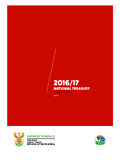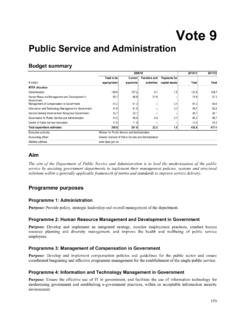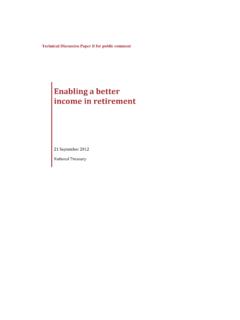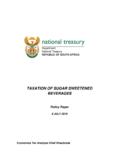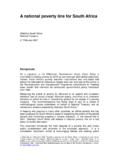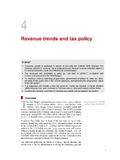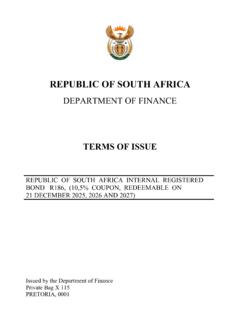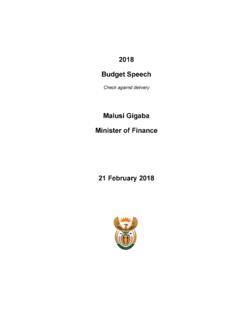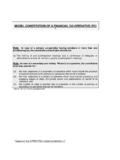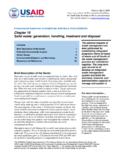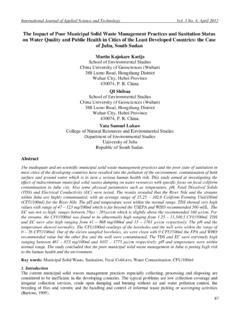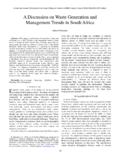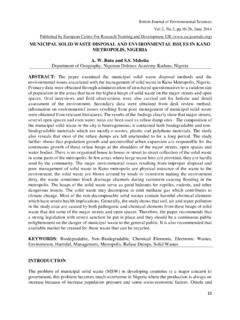Transcription of Solid waste services - National Treasury
1 17511 Solid waste services Introduction Solid waste management and service delivery systems can make critical contributions to public health, environmental sustainability, economic development and poverty reduction. Effective Solid waste management systems can contribute to improving public health outcomes through reducing opportunities for disease spreading vermin to thrive, such as occurs at unregulated local dumpsites. They contribute to enhancing environmental quality by protecting watercourses, ground water and preventing illegal dumping and littering. Well-designed Solid waste management systems support both higher levels of economic activity and can contribute directly to poverty alleviation through job creation.
2 Conversely, a failure to provide effective Solid waste systems is felt most severely by poor households. The National Environmental management : waste Act (2008) uses the waste hierarchy as its overarching principle for waste management . This hierarchy focusses on waste minimisation, reuse, recycling and recovery in preference to waste disposal. The Act also provides tools to implement the waste hierarchy through integrated waste management planning, providing for the development of integrated industry waste management plans, the identification of priority waste , waste licencing and the development of regulations to manage specific waste streams.
3 Managing waste in line with the waste hierarchy has the potential to provide jobs as recycling requires infrastructure and opens new markets. The Department of Environmental Affairs and Tourism s waste management Strategy seeks to address the backlog in the provision of waste services particularly to urban informal settlements and rural/tribal areas. Effective Solid waste management systems can contribute to improving public health outcomes 2011 LOCAL GOVERNMENT BUDGETS AND EXPENDITURE REVIEW 176 This chapter gives an overview of: institutional arrangements for Solid waste services access to Solid waste services financing Solid waste services waste minimisation, recycling and energy recovery.
4 Institutional arrangements for Solid waste services Solid waste management in South Africa is primarily a local government function. Section 156(1)(a) of the Constitution, read with Schedule 5, assigns responsibility for refuse removal, refuse dumps, Solid waste disposal and cleansing to local government. The waste Act outlines the roles of both National and provincial government in waste management . National government s competence to legislate is established in line with section 44 of the Constitution on the grounds of the need to maintain essential National standards, establish uniform norms and standards, and to promote and give effect to the right to an environment that is not harmful to health and well-being.
5 Provincial governments are tasked with the implementation of the National waste management strategy and National norms and standards, and may set additional, complementary provincial norms and standards. Local governments are required to ensure the sustainable delivery of services , subject to National and provincial regulations and standards. The most innovative feature of the National Environmental management : waste Act is the preference for the regionalisation of Solid waste management services . The Act also places considerable emphasis on the development of an integrated waste planning system, through the development of interlocking integrated waste management plans by all spheres of government and industry waste management plans for specified waste generators.
6 This planning system is the primary tool for cooperative governance within the sector. While the requirement for these plans is new for National and provincial governments, and for waste generators, this is not the case for local governments, which previously included waste management plans within their integrated development plans. Other focal areas of the Act include provisions for the development of norms and standards, financial management systems, standard by-laws and tariffs. These aspects of the Act largely repeat existing National or provincial powers that are provided for in other legislation.
7 The key change is that the Minister of Environmental Affairs and Tourism now assumes these powers in terms of the Act, albeit concurrently with other ministers, notably in the local government and finance portfolios. The assignment of Solid waste functions Table shows the assignment of Solid waste functions, following the generic schema of waste management responsibilities outlined Solid waste management in South Africa is primarily a local government function The National Environmental management : waste Act promotes the regionalisation of Solid waste management services CHAPTER 11: Solid waste services 177by the Department of Environmental Affairs and Tourism in 20077 and in terms of current practice.
8 Table Current allocation of Solid waste functions between roleplayersAreaBroad FunctionActivityIssueNatProvLocalPvtPoli cy-makingStandard SettingNorms and standardsXXWhat is to be providedAccess targetsXXPlanningPlans f or service expansionXXAdequate f acilities and s erv ic esPlans f or service improvementXXXS ervice ProvisionAsset creationSocial capitalXAdequate f acilities and s erv ic esPhysical capitalXXFinancingTarif f sXFinancial sustainabilitySubsidies to ConsumersXGrants to Service ProvidersXOperationConsumer selectionXEf f ective and sustainable servicesRecurrent expenditures- General area cleansingXX- waste minimizationXX- waste collectionXX- waste transportXX- waste disposalXXMaintenanceXXStaf f ingXEconomicXXXF inancialXXXO perationalXXXM onitoring & EvaluationXXXS ource: Department of Environmental Affairs and Tourism (2007)RegulationM&EQuality of s erv ic e deliv eryCurrent assignment Policy making functions To date, the focus of government has been on creating an overarching legislative framework to regulate waste management .
9 Since the promulgation of the waste Act in 2009, attention is now being given to implementation and the provision of basic refuse removal services . To this end, the Minister of Environmental Affairs and Tourism has issued the following regulations and standards: The National domestic waste collection standards, which came into effect on 1 February 2011. These standards seek to ensure uniformity in relation to the frequency of collections, transportation, receptacles and storage. The standards promote the separation of waste at source; meaning domestic waste should be sorted into recyclable and non-recyclable materials.
10 The municipal waste sector plan that requires municipalities to indicate how they are going to address the backlogs in waste services and the associated infrastructure. Regulations prohibiting the use, manufacture, import and export of asbestos and asbestos containing materials which is aimed at phasing out the use of asbestos in products in the country. Regulations providing for the management and financing of the disposal of waste tyres The Minister of Environmental Affairs and Tourism has also determined that the lighting, tyre, paper and packaging and 7 Department of Environmental Affairs and Tourism.
